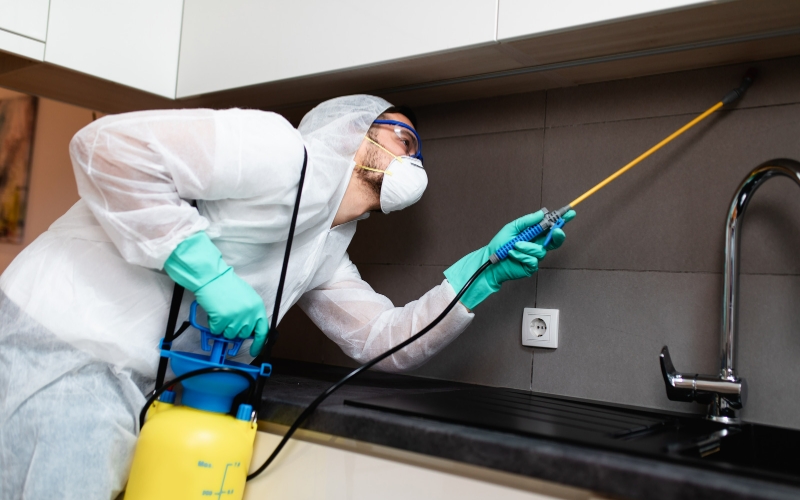Last Updated on March 18, 2024 by Kelvin Nielsen
Is your California apartment infested with cockroaches and aren’t exactly sure of what to do next? If so, read on to learn what rights and responsibilities you have under California law.
Under California habitability laws (CA Civ. Code § 1941.2), landlords have an obligation to provide tenants with livable property. Among other things, this means being provided with a home that is free of pests, such as termites and cockroaches.
And if a landlord isn’t able to do so, you may be able to exercise a number of legal options.
In today’s blog, we’ll walk you through everything you need to know regarding cockroaches in apartment law in California. This way, you’ll know your rights as well as what is expected of you when such an issue arises.
Cockroaches in Apartment Law in California
The following are answers to commonly asked questions on the topic.
Are there cockroaches in California?
Yes, California is home to five species of cockroaches. That is, German cockroach, Turkestan cockroach, American cockroach, oriental cockroach, and brown-banded cockroach.
What’s more, cockroaches are a common pest in all areas of California. As such, you’re likely to have a roach infestation at one point or another.
Related Post: Free Legal Advice for Tenants in California: Know Your Rights
What does California law say about cockroaches?
According to California Health and Safety Code Section 104316, landlords have a duty to provide tenants with livable premises. The landlord must not only take reasonable steps to prevent a roach infestation, but also respond to roach extermination requests within reasonable time.
The following are landlord responsibilities as per cockroaches in apartment law in California.
- Regularly inspect the unit for signs of infestations. The landlord must be in the lookout for things like egg cases, droppings, and live cockroaches.
- Seal up any openings, such as cracks or holes on walls, foundation, and walls.
- Fix any leaks or plumbing problems that can create a suitable breeding environment.
- Hire a professional pest control company to exterminate a roach infestation if it becomes necessary.
- Encourage your tenants to practice good sanitation.
Tenants, too, have responsibilities under the California apartment law. You must do the following.
- Keep your home clean and sanitary at all times.
- Store food properly in an airtight container to prevent cockroaches from getting to the food.
- Clean up spills immediately.
- Take out the trash regularly.
- Use cockroach baits and traps.
- Vacuum your home regularly.
- Avoid leaving food out overnight.
Can I sue the landlord for roach infestation in California?
Absolutely! Under California law (CA Civil Code 1940-1954.06), tenants can sue the landlord if they fail to keep the property habitable.
But before you can sue the landlord for roach infestation, you’ll need to ask yourself the following important questions.
- Does the roach infestation meet the threshold to make the property uninhabitable?
- Have you notified the landlord of the problem? The notice must be in writing.
- Have you received any rent concessions or other compensation from your landlording regarding the pest infestation?
- Do you have documented proof of the roach infestation?
- Is there any other person that can corroborate your account?
If most answers are in the affirmative, then you may be able to sue the landlord for roach infestation.
Other than suing the landlord, you may also be able to exercise other legal options as well. Including, withholding rent payments, repairing the issue yourself and then deducting the costs from future rent payments, or simply breaking the lease and moving out without penalty.
How can you tell if an apartment has roaches?
Before moving into a new apartment, it pays to do due diligence. During the proper showing, be on the lookout for the following telltale signs.
- Droppings. Roach droppings are about the size of a grain of rice, and are dark brown or black pellets.
- Roach eggs. These are small, white, and oval shaped. You can look for these in small cracks and crevices.
- Live roaches. Roaches are almost inactive during daytime. However, if you do see them during day time, then it’d certainly be a sure sign of a roach infestation.
- Sounds. Roaches make a variety of sounds, such as scratching, hissing, or chirping.
- Smell. Roaches have a strong, unpleasant smell. If you can smell this odor in the apartment, it’s a sign of roach infestation. Continue looking.
What is California tenant law on fumigation?
In California, if a landlord wishes to fumigate the property, they must provide the tenant with a 24 hours’ advance notice. In the notice, the landlord must include the following information as per the state’s tenant law on fumigation.
- Date and time of the fumigation.
- The type of fumigant the landlord is going to be using, as well as any potential hazards.
- Instructions on how you should prepare for the fumigation.
- Instructions on how you should re-enter the property after the fumigation is done.
Does the landlord need to pay for alternative housing during the fumigation? No! You are entitled to stay in the unit during the fumigation process if you choose to. However, if you choose not to, then you’ll not be able to hold the landlord liable for the extra housing costs.
Who is responsible for pest control, landlord or tenant?
Generally speaking, in California, landlords are responsible for pest control. The only exception is if the infestation is caused by the tenant’s carelessness or negligence.
You may not be able to hold your landlord responsible for pest control in California if you do the following.
- Keep the unit in a state of uncleanliness or in unsanitary conditions.
- Bring pests into the unit by not storing food properly.
- Failing to take reasonable steps to prevent a pest-infestation on the property, such as sealing small cracks or holes in walls.
Conclusion
There you have it – a comprehensive overview of cockroaches in apartment law in California. The responsibility of keeping your rental home pest-free is shared between you and your landlord. Be sure to check the lease for any specificities.
Disclosure: The content herein isn’t a substitute for advice from a professional attorney. It’s only meant to serve educational purposes. If you have a specific question, kindly seek expert attorney services.
Sources: https://www.tenantstogether.org/, https://www.dca.ca.gov/, https://www.pestworld.org/, https://insight-pest.com/, CA Civil Code 1940-1954.06, CA Civ. Code § 1941.2,

Hi, I’m Kelvin Nielsen, an experienced landlord and accomplished real estate lawyer. My focus is on answering your questions about renting in the hopes of making your life as a renter or a landlord a bit easier.







